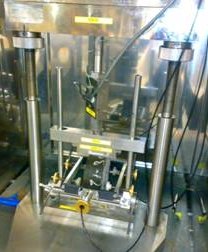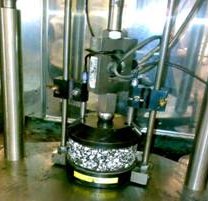Professor Tony Parry (NTEC) - Principal Investigator
Dr. Nick Thom (NTEC) - Principal Investigator
Oluwaseyi 'Lanre Oke, - Research Student
Sponsored by the University of Ado-Ekiti, Nigeria and the University of Nottingham, UK

Figure 1: The Nottingham Asphalt Tester (NAT) for conducting the Indirect Tensile Tests (Strength, Stiffness, and Fatigue)

Figure 2: The Repeated Load Axial Test (RLAT)
Background
Much has been done in the developed countries of the world, of which most have temperate climates, to ascertain the performance of cold bituminous emulsion mixes made from virgin materials. The use of reclaimed asphalt pavements (RAPs) under such circumstances has also received attention. Some of these countries have since developed guidelines for the production of cold mixes. Results from field trials of such cold mixes under such climates have been reported to be highly impressive and encouraging, though, inherent problems such as low early life strength and high porosity which are due to high water content of the mix, are still to be addressed. However, little or nothing has been done to ascertain the performance of such cold mixes or cold recycling of asphalt pavements in countries located in the hot climates of the world. Ascertaining the performances of such will, among other things, assist in the integration of such sustainable construction methods and materials into road building practices in these countries, where available funds for road building are increasingly inadequate to meet demand.
Aims and objectives
The current work tries to simulate what should be expected in terms of the performance of pavements produced from cold mixes of bitumen emulsion stabilized RAP in hot climates. Cold recycling in-plant has been selected for the obvious reason that it will enable an exercise of control on the quality of mixes produced in the process. Laboratory made RAPs, which mimic the materials normally used and the conditions of severely aged asphalt pavements typical of the circumstances being considered, will be produced and stabilised with bitumen emulsion. These mixes will be examined for performance using the NAT under modified testing configurations for the ITSM, ITFT and Axial (RLAT and VRLAT) Tests, since the major problems with roads in the tropics are fatigue cracking and rutting. The modification here is in relation to temperature. Also, the interaction between aged and virgin binders will be monitored using Fluorescence Microscope with the aid of proprietary dyes, and as well the Scanning Electron Microscope. The rate at which a virgin binder stained with dyes diffuses into the aged binder will be studied. The effect of parameters such as aged binder’s physical property i.e. penetration and compatibility and temperature effects, on the time taken for binders to attain optimum diffusion, which is pivotal to the performance of recycled mixes will be studied. The results obtained here and those under performance tests will be used to categorise RAPs into those suitable for use as wearing course or otherwise. Cold recycled mixes have generally been acclaimed to be economically viable, energy efficient and eco-friendly when used for road construction or upgrading. At the end of this research work, it is hoped that the findings will culminate in the development of guidelines for the production of bitumen emulsion stabilised RAPs for roads in hot climates.